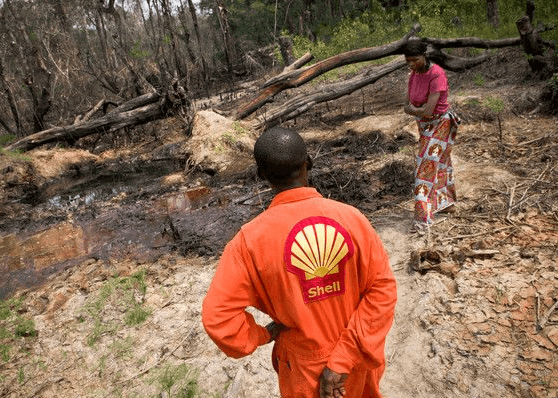 This is a guest post by Katie Redford, Director of EarthRights International.
This is a guest post by Katie Redford, Director of EarthRights International.
For many in the international human rights community, the new data about Shell’s security spending in Nigeria – including outlays of over $380,000,000 for just the period from 2007 to 2009 – released last week by Platform, is not surprising. The multinational oil giant has had deep involvement in the African nation for decades, draining the region of its resources while contributing to widespread, devastating pollution, and a wide range of negative human rights impacts, all in the context of continued community opposition to their operations and practices.
Shell’s financial support of the Nigerian military and police forces has led to devastation for families and communities in the Niger Delta for nearly two decades. In the 1990s, the execution of nine Nigerian environmentalists and the violent oppression of a peaceful protest movement directly stemmed from Shell’s payment to and collusion with the Nigerian military, the details of which were brought to light in U.S. federal court, thanks to a U.S. law called the Alien Tort Statute.
Despite settling one case brought in the U.S. in which they paid millions to the innocent Ogoni victims and their families, Shell is still fighting tooth-and-nail to avoid full responsibility for its complicity in those human rights violations. The company is now claiming in another case brought by other family members and victims of their abuses that the corporation cannot and should not ever be held legally responsible in U.S. courts simply because they’re just that, a corporation. And now, with the backing of other oil companies and their business and government friends, they want to enshrine corporate immunity for grave human rights abuses into law.
In October, the U.S. Supreme Court will hear Kiobel v. Royal Dutch Petroleum (Shell) in a case that will likely determine not only whether Shell is held responsible for their despicable actions, but also whether all corporations will be free to commit human rights violations without worrying about U.S. lawsuits.
Last week’s revelations about Shell’s security spending are surely the tip of the iceberg. But with multinational corporations like Shell, Nestlé, Rio Tinto and others fighting to secure immunity for their human rights violations, the fight for accountability and transparency from these companies has never been more important.
An extra tool in this fight was announced last week, as the U.S. Securities and Exchange Commission adopted rules that require oil and gas companies to disclose to the public the payments they make to foreign governments every year and for every project. We expect the EU to adopt similar rules in the coming months for both public and some private EU-based companies, and when disclosures finally begin, the people in resource producing communities and countries will finally know what their governments earn from their natural resources. For too long, these companies have made these payments in secret, allowing fraud, waste, and abuse to run rampant.
Rules like these, along with laws such as the Alien Tort Statute and public pressure from groups like Platform, help our movement hold corporations accountable for their actions. Over the next few months, we’ll continue working to hold Shell accountable in front of the Supreme Court. Join our campaign at TooBigToPunish.org.
